Suchergebnisse
FEELings - User Feedback for Energy Efficiency in Buildings
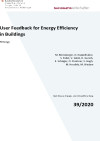
Der Energieverbrauch von Gebäuden wird maßgeblich durch das Verhalten von NutzerInnen beeinflusst. In diesem Forschungsprojekt wird ein neuartiges User-Feedbacksystem untersucht. NutzerInnen geben Feedback zur empfundenen Raumqualität. Auf Basis des Feedbacks werden Einstellungen an der Gebäudetechnik zur Energieeffizienz- und Komfortsteigerung optimiert. Der Proof-of-Concept für dieses neuartige System wird anhand von zwei Use-Cases erbracht.
Schriftenreihe
39/2020
M. Monsberger, D. Koppelhuber, S. Pabst, V. Sabol, H. Gursch, E. Schlager, O. Prentner, S. Singh, M. Herzlieb, M. Wedam
Herausgeber: BMK
Deutsch, 80 Seiten
Downloads zur Publikation
LINE-FEED: Plug-in Photovoltaik-Speicher für die Steckdose
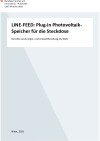
Im Projekt LINE-FEED wurden Technologien entwickelt, die für einen Photovoltaik-Speicher benötigt werden, der von jedem Laien an einer gewöhnlichen Steckdose angeschlossen werden kann. Ziel war die Entwicklung eines Speichersystems für Haushalte in urbanen Räumen, welche selbst keine Möglichkeit der Installation einer Photovoltaikanlage haben.
Schriftenreihe
45/2025
Christoph Grimmer, Patrick Salcher, Stephan Weinberger, Zlatko Bonjic, Klaus Krischan
Herausgeber: BMIMI
Deutsch, 32 Seiten
Downloads zur Publikation
50 grüne Häuser - Entwicklung und Demonstration eines Low-Tech-Grünfassadensystems
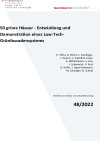
Entwicklung einer kostengünstigen gewerke- und prozessübergreifenden All-In Gebäudebegrünung inkl. Wartungskonzept ("Greening-Toolkit") zur breiten (vor allem straßenseitigen) Implementierung auf Fassaden im städtischen Bestand, kombiniert mit einer Prozessinnovation zur Vereinfachung aller notwendigen Abstimmungsprozesse.
Schriftenreihe
48/2022
U. Pitha, O. Weiss, C. Dantinger, J. Dunzer, C. Kaindl, B. Kainz, A. Mitterhauser, S. Lins, J. Schwanzer, V. Enzi, G. Hofer, S. Jäger-Katzmann, M. Lanzinger, B. Schoas
Herausgeber: BMK
Deutsch, 100 Seiten
Downloads zur Publikation
Sondierung eines Villacher Innovationslabors zur kooperativen Entwicklung von nachhaltigen Quartieren (Villab-Sondierung)
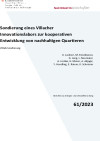
Das Projekt „Villab - Sondierung“ dient der Überprüfung der Machbarkeit eines urbanen Innovationslabors zur Beschleunigung der Transformation Villacher Quartiere in Richtung Klimaneutralität. Die positive Machbarkeit vorausgesetzt, werden die Kooperationen mit relevanten Stakeholdern vertieft und ein Businessplan für ein künftiges Innovationslabor erstellt.
Schriftenreihe
61/2023
U. Lackner, M. Panebianco, G. Lang, L. Neumaier, A. Jordan, H. Moser, A. Alijagic, Y. Hendling, E. Rainer, K. Schreiner
Herausgeber: BMK
Deutsch, 78 Seiten
Downloads zur Publikation
StadtKlimaVISION - Vorbereitung eines urbanen Innovationslabors für klimaneutrale Stadtplanung: In Linz beginnt’s!
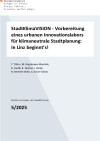
In StadtKlimaVISION wurde ein Innovationslabor für klimaneutrale Stadtplanung in der Stadt Linz konzipiert, mit dem Ziel, Instrumente der Stadtplanung stärker an Klimawandelanpassung und Klimaschutz auszurichten und Interessensgruppen aus Wirtschaft, Wissenschaft und Zivilgesellschaft einzubinden.
Schriftenreihe
5/2025
T. Tötzer, M. Bügelmayer-Blaschek, D. Havlik, B. Skarbal, J. Horak, N. Niemetz-Wahl, A. Geyer-Scholz
Herausgeber: BMK
Deutsch, 66 Seiten
Downloads zur Publikation
Low Tech – High Effect! Eine Übersicht über nachhaltige Low Tech Gebäude
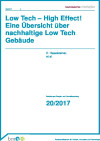
In dieser Studie wurden Ansätze von Low Tech Gebäuden näher betrachtet und besonders innovativ und repräsentativ erscheinende Konzepte detailliert dokumentiert. Ziel war es, den derzeitigen Stand der Technik und das vorhandene Know-how und Wissen anhand realisierter Beispiele aufzuarbeiten sowie Potenziale zur Weiterentwicklung aufzuzeigen.
Schriftenreihe
20/2017
Edeltraud Haselsteiner, Andrea Bodvay, Susanne Gosztonyi, Anita Preisler, Michael Berger, Bernhard Gasser
Herausgeber: BMVIT
Deutsch, 192 Seiten
Downloads zur Publikation
Plus-Energie-Campus - Energieflexibler Plus-Energie-Campus mit Living Lab
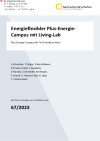
Im Projekt Plus-Energie-Campus wurden Wege zu einem nachhaltigen, zukunftssicheren Plusenergie-Quartier (PED) im Umfeld des Standorts der Fachhochschule Technikum Wien untersucht. Dabei wurde die Machbarkeit eines neuen Universitätsgebäudes als Plusenergie-Lehrgebäude im Detail untersucht und dessen Umsetzung vorbereitet. Zentrale Innovationsinhalte sind die energetische Flexibilisierung des Neubaus und des Quartiers sowie die Konzeption des Plusenergiehauses als "Living Lab".
Schriftenreihe
67/2023
S.Schneider, T.Zelger, E.Kerschbaum, R.Drexel, D.Bell, S.Goudarzi, E.Paráda, U.Schneider, M. Berger, F. Bucek, V. Huemer-Kals, B. Lipp, T. Sommerauer
Herausgeber: BMK
Deutsch, 289 Seiten
Downloads zur Publikation
Konzeption eines Test- und Demonstrationsgebiets für Wohnen und Mobilität im Umfeld von Haltestellen im oberösterreichischen Zentralraum (Suburbahn)
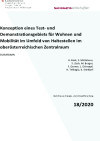
Zielgerichtete, prozessorientierte Konzeption für die Umsetzung und den Betrieb eines Test- und Demonstrationsgebiets für Stadtentwicklung und Mobilität in Ansfelden unter Einbindung relevanter Forschungsakteurinnen und -akteure, lokaler und regionaler Stakeholder, EntscheidungsträgerInnen sowie der interessierten Bevölkerung im Sinne eines „Living Lab“-Ansatzes.
Schriftenreihe
18/2020
H. Bork, S. Müllehner, S. Zech, M. Berger, F. Dorner, L. Dörrzapf, H. Tellioglu, K. Stieldorf
Herausgeber: BMK
Deutsch, 110 Seiten
Downloads zur Publikation
greening UP! Nachhaltige Grünpflege, Wartung, Instandhaltung von Vertikalbegrünungen inklusive rechtlicher Aspekte
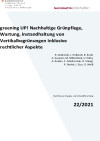
Im Projekt wurden aufbauend auf umfassenden Erhebungen und Analysen von bestehenden vertikalen Gebäudebegrünungen in Außenräumen (boden- und systemgebundene Fassadenbegrünungen) und vertikalen Innenraumbegrünungen passgenaue Grünpflege-, Wartungs- und Instandhaltungskonzepte erarbeitet und rechtliche Aspekte adressiert. Der "greening UP!"-Wissenspool mit konkreten Empfehlungen und anschaulich aufbereitetem Wissen sowie die Konzeption eines digitalen Tools zur "Ersten Grünen Hilfe" runden das Projekt ab.
Schriftenreihe
22/2021
R. Dopheide, J. Hollands, B. Knoll, A. Korjenic, M. Mitterböck, U. Pitha, A. Renkin, F. Schiefermair, R. Stangl, P. Skolek, I. Süss, O. Weiß
Herausgeber: BMK
Deutsch, 162 Seiten
Downloads zur Publikation
Syn[EN]ergy - Synergiepotenziale zwischen Stadtplanungszielen und Photovoltaiknutzung auf Freiflächen
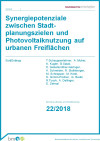
Im Rahmen von Syn[En]ergy wurden Synergien und Konfliktpotenziale der PV gegenüber anderen Nutzungen untersucht, planerische Lösungsvorschläge für konkrete Freiflächen unter Berücksichtigung ökonomischer, stadtplanerischer, gestalterischer, rechtlicher und sozialer Aspekte entwickelt und die Ergebnisse gemeinsam mit Stakeholdern aus Wirtschaft, Verwaltung und Gesellschaft bewertet.
Schriftenreihe
22/2018
T.Schauppenlehner, A. Muhar, K. Kugler, B.Salak, E. Gebetsroither-Geringer, A. Schneider, R. Stollnberger, M. Schnepper, M. Köstl, D. Grimm-Pretner, G. Bautz, R.Tusch, A. Dallinger, E. Sehnal
Herausgeber: BMVIT
Deutsch, 43 Seiten
Downloads zur Publikation
KlimaStadtLinz2030: Der Weg von Linz zur Klimaneutralität bis 2030 - Vorbereitung auf die EU-Mission „100 Climate-neutral Cities by 2030“
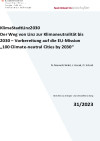
Das Forschungsprojekt hat untersucht, ob und wie es für die Stadt Linz im eigenen Wirkungsbereich möglich ist, Klimaneutralität bis 2030 zu erreichen. Eine gemeinsame Vision, die mit den Bürgerinnen und Bürgern partizipativ erarbeitet wird, vereint die Chancen, welche sich für die Stadt durch die für dieses Ziel notwendigen Maßnahmen ergeben.
Schriftenreihe
31/2023
N. Niemetz-Wahl, J. Horak, O. Schrot
Herausgeber: BMK
Deutsch, 48 Seiten
Downloads zur Publikation
Social Low Cost Flex: Gemeinschaftliche flexible Low-Cost- Energieversorgungskonzepte im sozialen Wohnbau
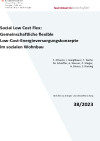
Ziel des Projekts war die Erarbeitung von Konzepten für gemeinschaftliche Erzeugungsanlagen bzw. lokale Energiegemeinschaften in sozialen Wohnbauten sowie die Entwicklung von Low-Cost Ansätzen, um vorhandene thermische und elektrische Flexibilitäten mit minimal invasiven Eingriffen für das Stromsystem zu aktivieren und zur Steigerung des Eigenverbrauchs im Wohnbau bzw. Quartier, aber auch im Sinne des Gesamtsystems zu nutzen. Ergebnis des Projekts sind auf ihre Realisierbarkeit geprüfte Low Cost Konzepte und Geschäftsmodelle zur Umsetzung von gemeinschaftlichen Energieerzeugungs- und –nutzungskonzepten im sozialen Wohnbau.
Schriftenreihe
38/2023
F. Ettwein, J. Ganglbauer, T. Nacht, M. Schloffer, A. Werner, P. Stieger, H. Bieser, S. Raming
Herausgeber: BMK
Deutsch, 37 Seiten
Downloads zur Publikation
HotCity - Gamification als Möglichkeit für die Generierung von Daten zur energieorientierten Quartiersplanung
Ziel des Projekts war ein Funktionstest, ob durch Gamification kosteneffizient, rasch und zuverlässig ein aktueller Datensatz von energierelevanten Daten zur Quartiersplanung erhoben werden kann. Dies wurde am Beispiel der Potenzialermittlung von industriellen und gewerblichen Abwärmequellen in Wien und Graz ermittelt.
HotCity - Gamification as a possibility to generate data for energy-oriented neighbourhood planning
The aim of the project was a functional test to determine whether an up-to-date data set of energy-oriented data can be collected for neighbourhood planning through gamification, cost-efficiently, quickly and reliably. This had been determined using the example of the potential determination of industrial and commercial waste heat sources in Vienna and Graz.
FEELings - User Feedback for Energy Efficiency in Buildings
Der Energieverbrauch von Gebäuden wird maßgeblich durch das Verhalten von NutzerInnen beeinflusst. In diesem Forschungsprojekt wird ein neuartiges User-Feedbacksystem untersucht. NutzerInnen geben Feedback zur empfundenen Raumqualität. Auf Basis des Feedbacks werden Einstellungen an der Gebäudetechnik zur Energieeffizienz- und Komfortsteigerung optimiert. Der Proof-of-Concept für dieses neuartige System wird anhand von zwei Use-Cases erbracht.
FEELings - User Feedback for Energy Efficiency in Buildings
User behavior is a key factor for the energy consumption and the actual energetic performance of a building. A new type of user feedback system will be investigated in this research project. Users provide feedback on the sensed room quality. The data obtained by the feedback system are used to optimize settings of building services in order to improve the energy efficiency and the comfort in the building. A basic proof of concept of this system will be undertaken by means of two use cases.
Energieschwamm: Das Gebäude als Energieschwamm - Strom rein - Wärme raus
Ziel war die Entwicklung und Demonstration in Praxistests von innovativen, dynamischen Regelungskonzepten in Kombination mit (Außenluft-) Wärmepumpen, welche durch Einzelraumregelung mit Überhöhungen bzw. Absenkungen von Raumtemperaturen zu einer bestmöglichen Wärmespeicherung von Strom (PV-Eigenverbrauch bzw. Netz-Überschussstrom) in der Gebäudemasse von Mehrfamilien-Gebäuden bei bestmöglichen aber auch variablen Komfortparametern führen. Wichtige Faktoren und Motivatoren für die Nutzerakzeptanz sollen ermittelt werden, als Basis für die Entwicklung von potentiell erfolgreichen Geschäftsmodellen.
F4WM - Fit4WienerMission
Vorbereitung auf die EU Urban Mission durch Aktualisierung von Zielen und Strategien (Smart City Wien Rahmenstrategie, Klima-Roadmap), Erarbeitung eines Manuals für klimaneutrale Wiener Grätzl und Grobkonzepte für die Beteiligung von Bürger:innen (Klima-Bürger:innenrat) und Wirtschaftstreibenden (Klima-Agreements), sowie einer stadtinternen Kapazitäten- und Strukturplanung.
F4WM - Fit4WienerMission
Preparation for the EU Urban Mission by updating goals and strategies (Smart City Wien Framework strategy, Climate-Roadmap), developing a manual for climate-neutral Viennese neighbourhoods and concepts for the participation of citizens (Climate Citizens' Council) and businesses (Climate Agreements), as well as a city-internal capacity and structural planning.
TANZ - Sondierung Reallabor: Tourismus als Chance für die Energiewende im Pinzgau
Sondierung für ein regionales Reallabor zur Beschleunigung der Klimaneutralität Österreichs 2040 in der Tourismusregion Pinzgau. Basierend auf zahlreichen Vorarbeiten wurden Realtests für die Innovationsfelder Sektorkopplung, Energiegemeinschaften und Nachhaltige Wärmelösungen konzipiert, die Organisationsstruktur des Reallabors erarbeitet und relevante Akteur:innen aktiv eingebunden.
